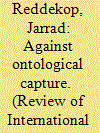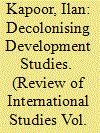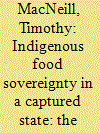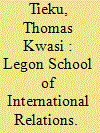|
|
|
Sort Order |
|
|
|
Items / Page
|
|
|
|
|
|
|
| Srl | Item |
| 1 |
ID:
187533


|
|
|
|
|
| Summary/Abstract |
This article offers an experiment in theorising within or across a ‘space’ of ontological disagreement – which, as numerous authors have contended, characterises much that is at stake in relations between states and Indigenous peoples in the Americas. Such ontological disagreements, I argue, contain radical potential for disrupting globally dominant and anthropocentric patterns of thinking and relating, and for generating alternatives. I substantiate this point with reference to the relational ontologies informing different Indigenous ways of analysing and practicing existence. Drawing on Amazonian Kichwa thinking and Anishinaabe accounts of treaties, I show how these relational ontologies recast the problem of how it is possible to relate with difference, in such a way as to fold an inter-human ‘international’ into a continuum of relations that include human-nonhuman ones. Distinct normative horizons emerge. I argue that non-Indigenous people can draw a range of provocations here concerning our constitution as selves and the political space in which we understand ourselves to possibly participate. I also claim, however, that this more transformative potential is predominantly squandered through processes of what I call ontological capture, which troublingly re-entrench dominant construals of reality and forestall a more radical questioning and re-patterning of accompanying lifeways.
|
|
|
|
|
|
|
|
|
|
|
|
|
|
|
|
| 2 |
ID:
192308


|
|
|
|
|
| Summary/Abstract |
This article explores ways of decolonising Development Studies by: (1) examining the discipline’s tendencies towards what some have called ‘imperial amnesia’, that is, proclivities towards disavowing if not erasing European colonialism, most evident in 1950s–1960s Modernisation theory, but also more recently in the work of such analysts as Bruce Gilley and Nigel Biggar; (2) considering the opportunities and perils of ‘epistemic decolonisation’, that is, ways of decolonising knowledge production in the discipline, including the limits of ‘non-Eurocentric’ pedagogies; and (3) reflecting on forms of material decolonisation (e.g., the reduction of socioeconomic inequalities by improving better access to education or resisting the corporatisation of publicly funded research) that need to accompany any epistemic decolonisation for the latter to be meaningful.
|
|
|
|
|
|
|
|
|
|
|
|
|
|
|
|
| 3 |
ID:
191788


|
|
|
|
|
| Summary/Abstract |
Feasts of Merit is a cultural phenomenon practised by several communities specific to their customs, traditions, and culture in different parts of the world. Whether or not the terminology is a colonial construct and/or a misnomer remains contestable. In the Tangkhul Naga context, the translation or notion of marān kasā as mere Feasts of Merit is a misnomer. Feast (of Merit) is only constitutive of marān kasā; thus, a part of a whole cannot be said to be the whole. This paper attempts to emancipate marān kasā from the coloniality of Feasts of Merit by debunking the colonial metanarrative; through the enunciation of socio-religious significance and culturo-educational functions of marān kasā that are manifestations of a deeper Tangkhul Naga, thus Naga, philosophy.
|
|
|
|
|
|
|
|
|
|
|
|
|
|
|
|
| 4 |
ID:
174552


|
|
|
|
|
| Summary/Abstract |
This study explores the emergence of the Afro-Indigenous food sovereignty movement in the context of a captured Honduran state and unequal political economy. In contrast with national-level research that has advocated a policy of food security in the context of non-indigenous campesino movements, this work explains how food sovereignty is more appropriate regarding Garifuna Hondurans. In a political economy that has precluded other options, and given the deep cultural relation that Garifuna activists have to land and autonomy, food sovereignty provides a possibility around which Indigenous development can be animated. It encapsulates a local ‘fight’ response to repression as an alternative to northern ‘flight’, often via migrant caravans, that many Garifuna have undertaken. This study shows how food sovereignty, more than being a technical policy set, is a discursive and material node through which dispossessed and especially indigenous populations can enhance decolonial power in the contestation of entrenched hegemonic and institutionalised power in a corrupt, unequal and colonised political economy.
|
|
|
|
|
|
|
|
|
|
|
|
|
|
|
|
| 5 |
ID:
183221


|
|
|
|
|
| Summary/Abstract |
The article explores the Legon School of International Relations (LSIR) which is the research, teaching, and academic programming of International Relations (IR) at the University of Ghana, Legon. The LSIR came out of attempts to decolonise knowledge production, dissemination, and academic programing in Ghana in early 1960s. The article shows that the LSIR is decolonial in theoretical perspective, grounded in southern epistemologies, relational in ontology, qualitative in methodology, practice-based, and it is equity-oriented. Although the LSIR scholarship as a package is distinctive, some of its ideas overlap with the work of several contemporary IR communities in the West. The article highlights implications of the LSIR story for the IR communities in the West and the value of paying close attention to the works of IR centres of scholarship in Africa.
|
|
|
|
|
|
|
|
|
|
|
|
|
|
|
|
| 6 |
ID:
144270


|
|
|
|
|
| Summary/Abstract |
This article reconsiders the hegemonic interpretation of Latin American regionalisms, which have been defined as expressions of the fragmentation power of ideologies. After identifying the main bias and limitations of this approach, two alternative analytical proposals are presented: critical International Political Economy (IPE), which reconsiders the region’s heterogeneity as the reflection of a variety of historical trajectories; and the increasingly influential Latin/Latin American modernity/coloniality approach, which re-authorises the voices of a multiplicity of ‘marginal’ subjectivities to the cognoscible world of international studies.
|
|
|
|
|
|
|
|
|
|
|
|
|
|
|
|
|
|
|
|
|